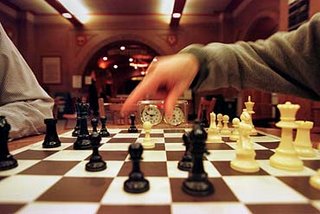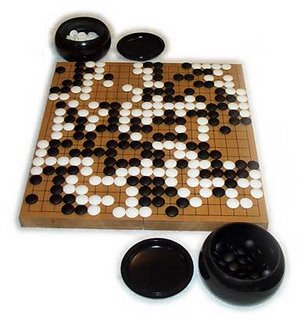In
my more general post about the 2nd Ammendment and an armed citizenry, I linked briefly to
a Harvard Magazine article by Craig Lambert describing the work of Dr. David Hemenway, author of
Private Guns, Public Health. Hemenway is one of the more noteable proponants of the current view that we have an 'epidemic' of gun violence in our society. And as a public health advocate, he wants it stopped. As such he, like many Americans, is little interest in questions about the constitution and militias, rather he simply wants to know: is the availability of gun in America causing an increased risk of gun injury, and if so, what can be done to reduce that incidence.
This is a pretty common theme among gun control advocates. "Sure", the argument goes, "it may be that in the unlikely event that someone breaks into your house, you'll be able to protect your family with a gun. But it's much more likely that a member of your family will kill or injure himself with the gun by accident."
Well, one of the things I do for a living is data, and one of the reasons I put so much work into making a living is that I have three small, beautiful children at home. So while I like my guns (all four of them...) I love my kids. And it seemed worth digging into the standard questions and data on this issues to see what is really going on.
Luckily, we live in the a country with lots of great public information available over the internet. So you and I are perfectly free to go trawl
the Center For Disease Control data about causes of death and injury throughout the country each year. (Last year of data available, 2003.) I'll first look at the major complaints about gun accidents put forward by gun control advocates, and then look at the hard data dealing with the topic.
The biggest fear, for parents especially, is of children finding guns and hurting themselves by accident (or while playing with the gun). The
American Academy of Pediatrics has this to say:
Q) How can I keep my child safe from gun injury?
A) The safest thing for your child is not to have a gun in your home, especially not a handgun.
And Lambert's Harvard Magazine article has this to say:
Many times a teenaged boy will find a gun such as a semi-automatic pistol in his home and, after taking out the ammunition clip, assume that the gun is unloaded. He then points the pistol at his best friend and playfully pulls the trigger, killing the other lad with the bullet that was already in the chamber. "People say, 'Teach kids not to pull the trigger,' but kids will do it," Hemenway says. In a 2001 study, for example, small groups of boys from 8 to 12 years old spent 15 minutes in a room where a handgun was hidden in a drawer. More than two-thirds discovered the gun, more than half the groups handled it, and in more than a third of the groups someone pulled the trigger—despite the fact that more than 90 percent of the boys in the latter groups had received gun-safety instruction.
Hence product redesign may do more good than safety education. Hemenway suggests such changes as adding "a magazine safety, so that when you remove the clip, the gun does not work. Or make guns that visually indicate if they are loaded—just like you can tell if there is film in a camera."
(You can read the study that he mentions here.) Well, there a couple things to note here. A number of guns already have the safety features that Hemenway mentions here. Also, I kind of wonder how realistic a test this was. I mean, 8-12 year olds may be inexperienced and exuberant, but they're not idiots. If they're set loose in a room as part of a study (even though they don't know what they study is of) many of them would probably assume that any gun they find in the room is either a fake or unloaded. It's not quite the same as finding your dad's .45 in his sock drawer and horsing around with it.
It's certainly true that a number of people die in the US each year as a result of gunshot wounds. From the Harvard Magazine article:
Gun deaths fall into three categories: homicides, suicides, and accidental killings. In 2001, about 30,000 people died from gunfire in the United States. Set this against the 43,000 annual deaths from motor-vehicle accidents to recognize what startling carnage comes out of a barrel. The comparison is especially telling because cars "are a way of life," as Hemenway explains. "People use cars all day, every day—and 'motor vehicles' include trucks. How many of us use guns?"
Suicides accounted for about 58 percent of gun fatalities, or 17,000 to 18,000 deaths, in 2001; another 11,000 deaths, or 37 percent, were homicides, and the remaining 800 to 900 gun deaths were accidental.
The first thing that jumps out at you is that the US primarily has a suicide and homicide problem. The number of actual accidental deaths is tiny.
Now, Lambert acknowledges this in the Harvard Magazine article, however he argues (as apparently does Hemenway in his book) that without guns available, people who contemplate suicide are less likely to be successful, and people who commit crimes (if they're not carrying a gun as opposed to if they are) are less likely to injure or kill their victims.
Here, I suppose, you run into a question of how one thinks about the world. The purpose of a gun is to hurl a small but very dense projectile very, very fast -- thus punching a hole in whatever it hits. This means that if you use one to commit suicide, you're likely to be successful. Now, I'm in no sense in favor of suicide. I believe it to be a grave moral sin, which by its nature drastically reduces one's chances of having time to repent and seek forgiveness before death. But while I believe people
shouldn't commit suicide, I'm not sure that denying them effective tools for doing so is the right way of dealing with the problem. (I'm not saying it wouldn't be effective, I'm just not sure that it's the right thing to do.)
Similarly, I'll admit that it's true that if one could somehow make guns very, very scarce, that fewer people would be killed by gun wielding criminals. While it's true that determined criminals (say, bank robbers or hard core gang members) will be able to get guns no matter what, more casual criminals would probably forgo guns in a less gun saturated society. However, I have a tempermental preference for a world in which, even if criminals can get hold of guns, I can have them as well, than one in which I'm definately not going to be armed, and many (though not all) criminals still are. (And I'm not even the sort of gun owner who keeps guns loaded and ready to hand. It would take me a good minute or two to go upstairs, unlock my handgun case, slap the magazine into place, and work the slide.)
Yet these considerations aside, we still have the 800-900 accidents that take place very year. Are these indeed mostly cases of boys pointed automatics at their best friends, thinking they are unloaded?
Well, with the help of the CDC's website, I pulled the data for 2003, the last year available, and I bucketized the data by age range.
| Age | Accidental Gun Deaths | Total Population | Rate |
| 1-7 | 15 | 27,424,800 | 0.0000547% |
| 8-13 | 24 | 25,086,531 | 0.00009567% |
| 14-18 | 88 | 20,628,022 | 0.0004266% |
That's a total of 127 accidental deaths. For comparison, I pulled accidental deaths by drowning for the same period and the same age ranges. (I thought drowning was a good comparison, as opposed to car accidents, since people are in cars every day, while swimming is an occasional recreational activity which many children are not accustomed to doing safely.)
| Age | Deaths by Drowning | Total Population | Rate |
| 1-7 | 550 | 27,424,800 | 0.00200548% |
| 8-13 | 102 | 25,086,531 | 0.00040659% |
| 14-18 | 258 | 20,628,022 | 0.00125073% |
That's 910 deaths by drowning in the same period: more than seven times as many.
So where does the famously large number of child gun deaths come from? Well, first of all, a lot of gun control advocates (including the APA in the page linked to above) use statistics that include homicide and suicide as well as accidents, and they include ages 1-19 instead of 1-18, since 19-year-olds have a staggering number of homicide deaths and suicides compared to real children. Sticking with the same buckets and time period as before, here are the stats of murder and suicide.
| Age | Gun Suicides | Total Population | Rate |
| 1-7 | 0 | 27,424,800 | 0.00% |
| 8-13 | 0 | 25,086,531 | 0.00% |
| 14-18 | 536 | 20,628,022 | 0.00259841% |
| Age | Gun Homicides | Total Population | Rate |
| 1-7 | 0 | 27,424,800 | 0.00% |
| 8-13 | 52 | 25,086,531 | 0.00020728% |
| 14-18 | 1103 | 20,628,022 | 0.00534710% |
Now, I don't for a moment mean by any of this that gun safety is not important. Gun safety is incredibly important, because guns are incredibly dangerous when misused. But this data seems to suggest very strongly to me that Americans actually do a very good job of keeping small children from harming themselves with guns. Without question, guns should be stored safely, and children should be taught how to handle them safely (and what they can do to something which is shot). But it does appear that this kind of training can and does work to prevent accidental gun deaths the vast, vast majority of the time.
The danger area with guns is when teenagers get old enough to get hold of them and decide to use them in crime to to kill themselves. That's a major societal and legal problem. But it's not a gun safety problem.












